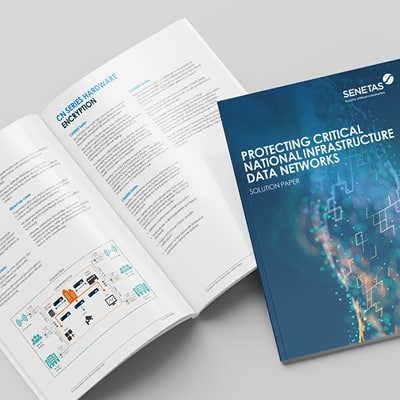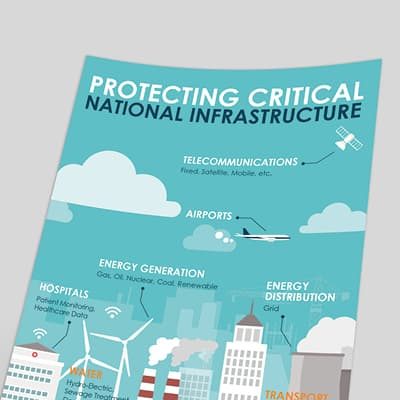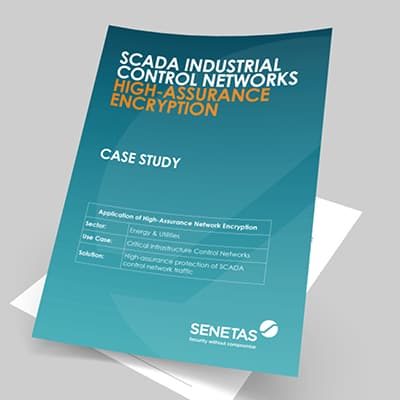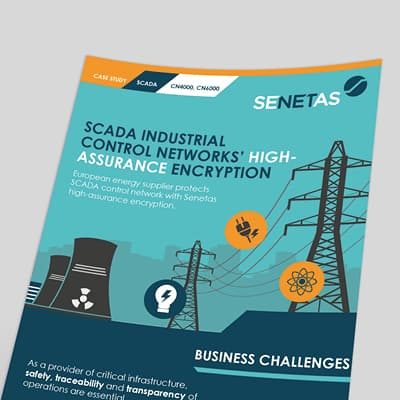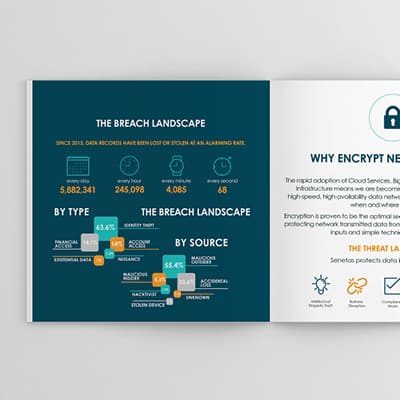Infrastructure and industrial control systems security is of national importance due to the essential nature of the services they provide. Risks of cyber-attacks and interference with control systems have never been greater. Encrypting automation and control data (SCADA Networks) provides essential protection and security.
The Importance of Encryption for Critical Infrastructure
Critical infrastructure and industrial assets are high profile targets for criminal and terrorist attacks. The business systems used by utilities and industrial organisations – such as data aggregation and revenue billing systems – are also at risk.
The data networks used to control these assets and transmit business-critical information are the weak link. Data networks are not inherently safe!
The infrastructure and industrial process organisations using Supervisory Control And Data Acquisition (SCADA) networks, face the critical risks of data input, corruption, tampering and other data interference, that can have catastrophic consequences.
Whether the risks to utilities and industrial organisations’ high-speed network data threaten asset control systems or business systems’ data – theft, data disruption, tampering or data corruption – the consequences can be serious for many stakeholders.
The potential economic impact is significant.
Because such assets are typically of national importance, many governments regulate the protection of their data networks and even mandate the use of certified data encryption.
The risks to the SCADA networks expose communities to very serious health and safety risks, as well as obvious serious economic consequences. Whether public or private assets, the consequences are the same.
Ultimately, the optimal protection of control system and business data networks is to protect the data itself. Encryption provides that data protection – rendering access by unauthorised parties useless.
Senetas certified high-assurance encryptors provide that encryption, without the loss of high-speed data network performance.
Protecting Critical Infrastructure, Utility And Industrial Control Data
Major infrastructure, utilities and industrial organisations face two primary risks to their data transmitted across high-speed networks:
The security of major infrastructure, utility and industrial assets – from rogue data, data tampering and disruption;
The protection of valuable aggregated business data and Smart Grid and Smart Metering revenue data.
Infrastructure and assets in the energy, resources and industrial processes sectors – refineries, chemical plants and power generation facilities – are critical to communities and the national economy.
This makes them prime targets for cyber-criminals and terrorists. Data security risks are threats to public health, safety and the environment. They also threaten essential services and business performance throughout the economy.
Since data networks have been used for process control and automation, the need for secure and reliable high-speed network data transmission has become critical – to the asset owners and the broader economy.
The vulnerabilities of industrial control systems using high-speed data networks expose communities to very serious risks:
- Loss of life and other serious safety issues
- Devastating environmental impact
- Significant loss of production
- Major equipment damage
- Reputation damage
Similarly, the use of high-speed data networks for transmitting aggregated business data, Smart Grid and Smart Meeting data also expose infrastructure asset owners to very damaging consequences:
- Theft of intellectual property
- Breach of business and competitive secrets
- Privacy and compliance breaches
- Lost revenue billing information
Senetas high-assurance data encryptors provide the optimal data protection necessary for secure and safe infrastructure and industrial asset processes and control systems as well as transmitted business data, without impacting on network performance.
Data Networks Are Not Inherently Safe!
Supervisory Control and Data Acquisition (SCADA) data networks, whether private or public, are often high-speed fibre-optic links. Like all data networks, these are not inherently safe.
They are vulnerable to malicious attacks, interruption and even innocent human and technical errors in data transmission (such as routing table errors).
Therefore, the data itself must be protected to help ensure its integrity and prevent serious consequences of disruption, manipulation and theft.
Efforts to protect the network itself are simply a process of “catch-up”; whereas protecting the data itself by encrypting it, renders the data useless in the event of a successful network breach! The last line of defence.
Data Integrity and Assurance
As the risk of cyber-attack against critical infrastructure and industry increase around the world, governments and regulatory authorities are increasing their focus on the security of the data networks and the data that controls them.
Senetas encryptors are ideally suited to high-speed data networks requiring maximum, high-assurance data protection, bandwidth performance, low cost of ownership and exceptional up-time availability.
Senetas high-assurance encryptors have been a first choice of some of the world’s most secure government and defence organisations, they are ideally suited to protecting critical infrastructure and industrial assets’ data.
Senetas high-assurance encryptors include the added peace of mind that comes from certification by leading, independent testing authorities as being suitable for government and defence use.
Senetas certifications include:
- FIPS (US)
- Common Criteria (international)
- NATO (all member states)

